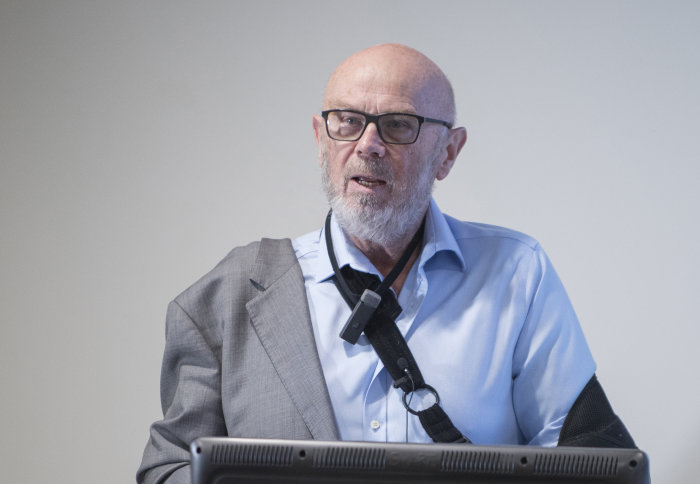Education and more awareness campaigns are key to tackling raised blood pressure
by Maxine Myers

Less than half of the population with raised blood pressure are aware they have the condition, says an Imperial expert.
Professor Neil Poulter, Honorary Consultant Physician and Epidemiologist at Imperial College Healthcare NHS Trust and Professor of Preventive Cardiovascular Medicine at the College, has been working to tackle high blood pressure at a global level. He recently presented his research on raising awareness of the impact of raised blood pressure, at St Mary’s hospital in a packed lecture for the Imperial College Academic Health Science Centre (AHSC).
Raised blood pressure - which when it requires treatment, is known as hypertension - is the biggest single contributor to a range of conditions such as stroke and heart attacks. It also accounts for around 10.4 million deaths worldwide each year.
Despite the fact that it is easy to measure blood pressure, less than half of those with hypertension know they have it which is pivotal explanation as to why only a minority get their blood pressure controlled to current targets.
As President of the International Society of Hypertension, Professor Poulter set up a global screening campaign called ‘May Measurement Month’ in 2017 and 2018. The aim of the campaign was to raise awareness of the importance of measuring blood pressure. They also wanted to use the data to make governments and policy makers from around the world change facilities for screening and management of blood pressure.
In 2018, more than 1.5 million people were screened in 89 countries and as a result over 330,000 people with untreated or uncontrolled blood pressure were identified. The event will take place again this year.
Professor Poulter also talked about his work leading the ASCOT trial- Europe’s largest study on hypertension. The study showed that a combination of newer drugs - a calcium-channel blocker and an angiotensin-converting enzyme inhibitor, plus a statin, greatly reduced coronary and stroke events compared with what had been, hitherto, standard care. These findings were later incorporated into NICE guidelines for hypertension management in the UK. However, Professor Poulter outlined that more work needs to be done to find the right combination of drugs for black and south Asian patients.
Professor Poulter explained that education is key to tackling the issue of raised blood pressure. Patients need to be educated on the importance of the condition and doctors need to be educated on how to communicate, treat and manage raised blood pressure.
Professor Poulter was joined by Professor Paul Elliott, Chair in Epidemiology and Public Health Medicine at Imperial College London, who talked about his work on producing public health strategies to reduce blood pressure.
The seminars are an example of the work carried out by Imperial College AHSC, a joint initiative between Imperial College London and three NHS hospital trusts. It aims to transform healthcare by turning scientific discoveries into medical advances to benefit local, national and global populations in as fast a timeframe as possible.
Article text (excluding photos or graphics) © Imperial College London.
Photos and graphics subject to third party copyright used with permission or © Imperial College London.
Reporter
Maxine Myers
Communications Division
